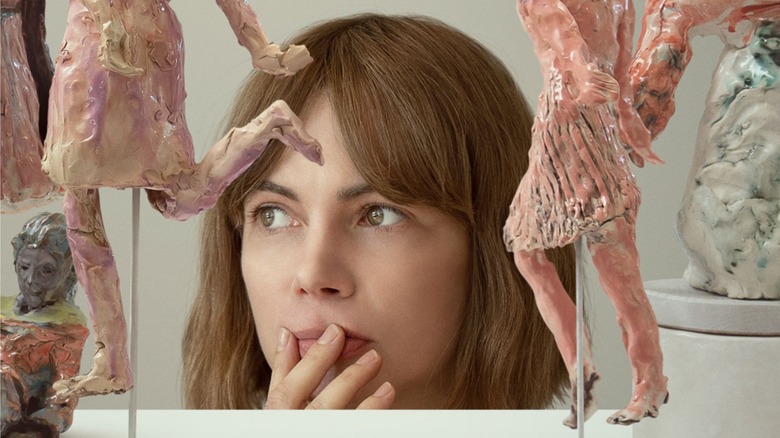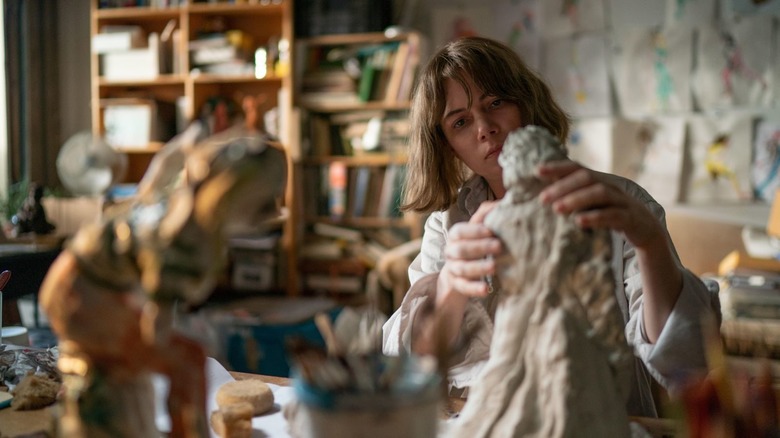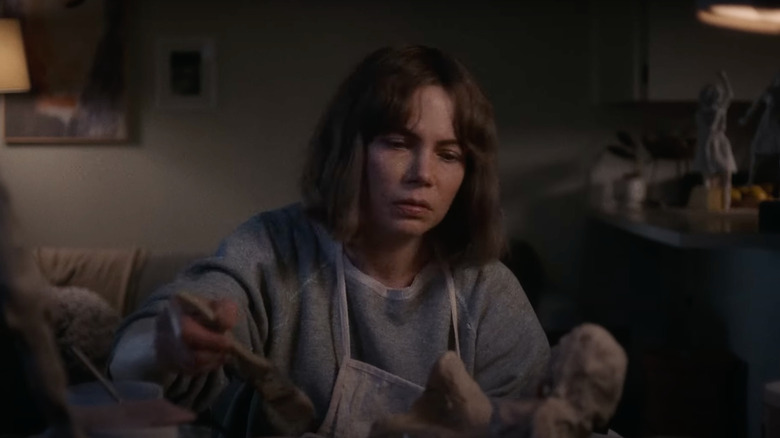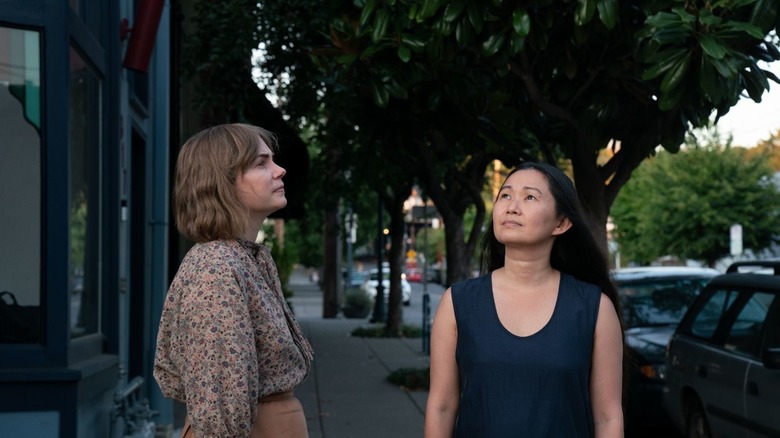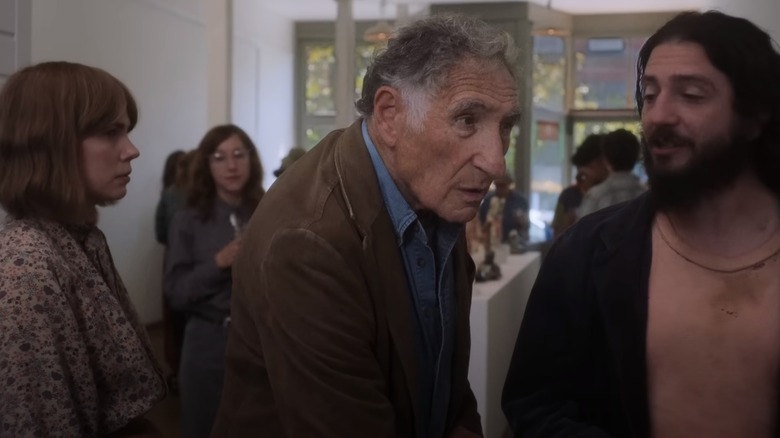Showing Up Director Kelly Reichardt On Working With Michelle Williams, Judd Hirsch, And Animals [Exclusive Interview]
Remember when "First Cow" came out in 2019, lighting Film Twitter on fire thanks to a combination of incredibly poignant storytelling, a strong and compelling bond between its two working class main characters, and an utterly (udderly? sorry) adorable bovine at the center of it all? Indie studio A24 did what they do best and leaned into those aspects (especially the bovine of it all) for as much as it was worth, driving up buzz online and helping turn writer/director Kelly Reichardt's quiet and unassuming movie into a film festival hit.
So how would the filmmaker hope to recapture that magic with the next A24 collaboration? Well, Reichardt remains blissfully unaware of the whims of social media ("Fortunately," she dryly states during our conversation) and whatever marketing power it may or may not hold, allowing her and frequent writing partner Jon Raymond to concentrate solely on the needs of the script in front of them. That focus paid dividends on "Showing Up," the upcoming slice-of-life film starring Reichardt regular Michelle Williams as Lizzie, a frazzled sculptor attempting to navigate the minefields of her impending showcase, her dysfunctional family, and her irritating fellow artist/landlord Jo (a brilliant Hong Chau).
Not only is the film a surprisingly funny drama (/Film's Caroline Cao reviewed the film here), but it also shares a serendipitous parallel with "The Fabelmans." In a recent Zoom interview, I spoke with Reichardt about beating Steven Spielberg to the punch in casting Judd Hirsch and Michelle Williams as estranged relatives, working with animals in the tradition of her other films ("Showing Up" happens to star a scene-stealing pigeon), why the character of Lizzie was described as a "trapped badger," and more.
Note: This interview has been lightly edited for clarity and brevity.
'I think you find ways to get things shown'
After "First Cow" and now "Showing Up," do you ever worry about if original, low-budget films still have a place in getting people to go out and see these movies? Do you ever worry about that whatsoever?
No. No. I mean, I worry about a lot of things. Is there going to be any water to drink in 10 years, five years? But I don't worry about that. I mean, whenever we're making a film, I always think, "Oh my God, this is our last chance, this is our last film. What is the likelihood they're going to let us do this again?" It always seems like a miracle we're making another movie. So, I don't know. I've been hearing that indie film's dying since I was 20, and so I don't have my finger on the pulse enough to ... Boy, I guess I'm living in my little bubble with the people I make films with and we just kind of try to focus on what we're doing and I don't know. I think you find ways to get things shown. I mean, yeah, if I was younger, maybe I'd get all caught up in it, but at this point? Eh [laughs].
For your movies in general, when directing these animals and the practical concerns of working with the actors, how difficult is it to wrangle all that in the middle of such a busy production?
Well, we had a cat in this movie, and like with all animals, it slows you down. You've got to slow down. Animals don't work at your pace, and so the whole crew has to slow down and the crew has to get quiet and — everything that's unnatural for a film crew to do is what has to happen. So that's the nature of working with animals, for the good and the bad of it. Yeah, it's quite tricky, but you just can't move at your regular pace when you have animals. That's how it is.
'I'm not looking for people to act more'
How exactly does that storyline come together when you and Jon are writing the script? The animals sort of fit the slower paced vibes in the movie. How does that come about?
The slower pace vibes? I don't know. I don't think this is being such a slow film, but I don't know. That, I think, is just my natural rhythm of how I shoot and how I cut. I think people's own rhythms come out in what they make, and that's probably my rhythm.
Something I really enjoy about your movies in particular is the characters rarely ever say exactly what's on their mind. You kind of leave it up to audiences to dig deep. When you have an actor as talented as Michelle Williams, do you ever have to fight the urge to give her a multi-page monologue or let her have more of a showier performance?
No, I mean, I think dialogue is just one element and Michelle can use her full body to express herself. She likes doing things and so there's always a lot of physical things for her to practice and learn before the films. And she likes digging into those things. I mean, settling someone down into a chair and having them talk, that's one way at it. But that's not — to me, I like to get things across by the frame and how you move things through the frame and sound design, and Michelle gets things across like all actors do: through their voice and their gestures, their posture, the way they walk, the way they lift something, the way they interact with animals. All these things, the way you carry your purse [laughs], whatever it is.
So I'm not looking for people to act more. The great thing about working with animals is people have to concentrate and respond to the animal in the room, and you don't have time to concentrate on what you're thinking you should be doing. You're trying to move people away from "acting" or whatever it is. I mean, acting's kind of a mysterious thing, so it's hard for me to talk about. But yeah, I don't think Michelle would think she's getting more, if she had more lines.
'An early description [...] of Lizzie was that she was a trapped badger'
With your art school background, and you're currently teaching at a liberal arts college, how does that factor into this movie? Was this something you wanted to make for a long time? Was that more of a personal element to it, with Michelle's character being a sculptor?
I consider the films to be personal films because I put so much of myself into them, but I'm never looking to make films about myself. That's why I like working with Jon Raymond, because I like working stories of art. But we loved this school, Oregon College of Arts and Crafts, and we really wanted to make a film there. It was a really important institution and it closed and we were lucky to be able to shoot there because all the action stopped because it was Covid. That was a really important art school for the Pacific Northwest for a really long time. It's over 100 years old, that school.
So it's a huge loss. Art schools are closing down all over the country and the humanities are sort of dying out. Solid democracy needs art schools and the humanities. So that was important to us. And honestly, Jon Raymond's been wanting to make a high school comedy forever. And this is probably as close to that as we'll ever get.
I think people will be surprised by just how funny this movie actually is. Is that embedded in the script right from the start?
It's in different places at different times. I think it's in the script, and I think, again, you work away from it. And Michelle finds her place to put things, as does Hong, and sometimes it's done with a cut. It can happen, but it's in the script, you don't need it to be in all places at once. That's for sure. The actors aren't playing for that, though often it can be through their performance that something comes alive, but sometimes it's working because they're not playing towards that.
Regarding Michelle's character, was there any specific inspiration in mind for someone who just holds things in all the time until it finally has to release at some point?
Well, we were just figuring out who she was, and an early description Jon Raymond had of Lizzie was that she was a trapped badger. I really loved that description and kind of held onto it. So the more exposed she feels, the more she kind of lashes out. So the film is, there's a building up, but building onto her worries and stresses, but maybe they're really all distractions from the things she's really stressed out about. Who knows? But yeah, I think the trapped badger image was a good one.
'Judd told me about it every day on set'
This marks the fourth collaboration between you and Michelle. Over time, is that more challenging where you kind of have to make sure you don't fall into a sort of creative rut? Or do you have that level of shorthand with her where that's not even an issue?
I do think it's in between. I make films with Michelle and then I make a film without her and she's off doing stuff, including having children or making films, and then you come back together. And then you have new experiences. I think if you kept working with the same actor straight through, especially since I edit my films, it would be difficult to ... it takes a while after you've worked with someone to stop seeing them in the role you just had them in.
It's why I'm reluctant to go see Michelle or Hong in other movies. I'm just like, "I know these people, let me see as little of them doing other stuff as possible." Though I will say I was quite inspired by seeing Michelle in "Fosse/Verdon." I just thought she was amazing and I really like Sam Rockwell in that series. So it was great. I was like, "Look what Michelle is doing. Ah!" But yeah, you kind of hold on to the character they were for a while and you've got to break away from that. Some stuff has to happen in between, including aging. Whatever it is.
I do have to ask whether you've seen Spielberg's "The Fabelmans" with Michelle Williams...
I haven't really seen any films this year, I have to admit. I've just been doing other stuff and I haven't seen them.
Casting Judd Hirsch as Michelle's older relative that she has complicated history with, that comes up in both "Showing Up" and "The Fabelmans."
I only came to know about it because Judd told me about it every day on set. "I'm going to be in Steven's movie." I'd be like, "Okay, good, now we're doing this movie." Yeah. He is a great American actor. He's a great actor. He really is. And he leaves you with a lot to work with. Any take he does, he does everything differently. He always seems like he's not even paying attention. Then you start rolling and you don't know what he is going to come up with. He gives you a lot of different things and you have so many good choices in the editing room.
I really don't know if I ever really get moved on a movie set. I'm just too caught up in everything that's going on. But the scene with him and Michelle in the father's studio really got me while we're shooting it. I was just like, "Ah!" So it doesn't surprise me that he's on a lot of people's ... I mean, probably Spielberg's paying a lot of attention to what I'm doing [laughs]. I imagine he's keeping a close eye on that. That's probably how it all happens, I'm guessing.
"Showing Up" comes to theaters on April 7, 2023.
